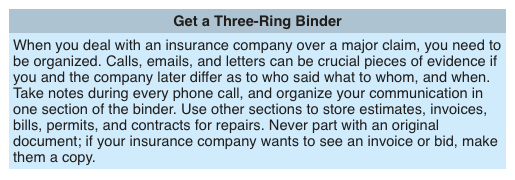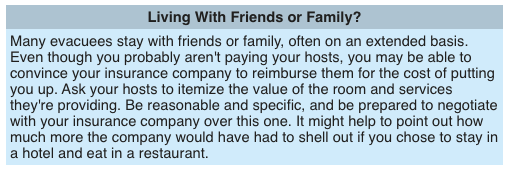After the Fire: Dealing with Your Insurance Company
Homeowners whose property has been damaged or destroyed will look to their insurance for relief. Here are ten tips to keep in mind as you interact with your insurance company and its adjustors.
1. Get an Advance
If you were forced to evacuate, you might not have grabbed basic necessities -- from a toothbrush to clothes that you can wear to work. Your homeowner's policy will cover the cost to replace these items, but you don't have to file a claim and have it approved before heading to a department store to purchase that suit you need for the office.
Instead, ask your company for an advance against your eventual claim. Ask a representative of the company to bring a check to you wherever you're staying, be it a hotel or a friend's house. Save the receipts for everything you buy, and be reasonable --if you lost khakis and a blazer, don't head for the Armani suits (you'll end up paying the difference).
Check your policy -- even if you have "replacement" coverage (see Tip Six, below), you may have only "actual cash value" for the contents of your home. A good agent will alert you to this and suggest buying an endorsement so that your contents will be covered under a replacement policy, too.
2. Secure Your Property
Every policy requires you to take reasonable steps to minimize the harm to your property. In legalese, this is known as your duty to "mitigate damages," and it includes such common-sense steps as covering a section of your leaky roof with a plastic tarp until you can get it repaired, or turning off the water when you discover a burst pipe. Depending on your situation, there may be steps you can take after the fire is gone (your insurance company will pay these costs when you make your claim):
- Stop the smoldering. If the structure is still burning, contact the fire department to do what's necessary to prevent a flare-up.
- Board it up. To prevent vandalism, board up your property and consider erecting a portable chain-link fence to keep people away.
- Be vigilant. Depending on the situation, you may need to keep a close eye on your property, checking for new problems and making sure it hasn't been disturbed.
3. File Your Claim Right Away
All policies require homeowners to report their loss as soon as is reasonably possible. You can comply by calling your agent or sending an email. After that, you'll be asked to submit a "proof of loss claim," in which you itemize your losses and list the value. If you delay notifying your company, you may find yourself far down on the list when it comes time for the company to send an adjustor to deal with your claim.

4. Make Sure the Insurance Company Acts Promptly
Fortunately, insurance companies are required to handle claims in a timely manner. In California, they must send you a "notice of intentions" within 30 days of receiving your claim. If there's no dispute, you're entitled to payment within that time, too. If you haven't heard from your company and you feel that they are unnecessarily dragging their heels, write to them (and consider sending a copy to your state's Department of Insurance). Insurance companies are less likely to string you along when they're in the midst of a disaster and know that all eyes are on them.
5. Keep Track of Your Living Expenses
Your policy will include a "loss of use" clause, which entitles you to reimbursement for living expenses while you're out of your home. However, you're entitled only to additional living expenses -- that is, the difference between what it costs you to live on a daily basis at home and what it costs now. For example, if you ate most meals at home before the fire and regularly spent $300 a week on groceries, but are now spending $400 per week at restaurants, you can claim only $100.
When it comes to the motel bill, however, you can probably claim the whole thing. Even though you can't live at home, you still have to pay your mortgage, taxes, and insurance. (See Tip Seven, below, for more on paying your insurance premiums.)

6. Get the Right Repair Estimates
Your homeowner's policy will enable you to rebuild or repair your home. If you have an "actual cash value" policy, you're entitled to the amount of money it will take to return your home or its contents to its market value before the fire. If you have "replacement" coverage, you're entitled to the amount it would take to replace the home or contents, regardless of the value of what you lost.

For either type of coverage, you'll need an estimate of the prior market value or the cost to replace the damaged items or parts. Your insurance company will offer its own estimates, supplied by its own adjustors. Because these adjustors work for the insurance company, it's in their best interests to get you to quickly accept a modest settlement. You're under no obligation to accept these numbers.
Instead, hire an independent estimator who will work for (and be paid by) you. Choose a contractor who is experienced not only in building, but in how insurance companies respond to typical issues. Be sure that you and the insurance company agree on the scope of work to be done if you're replacing or repairing. If you're dealing with an actual cash value policy, don't accept the insurance company's number unless you are satisfied that it's a fair estimate of what a buyer would have paid for your home just before the disaster.
7. Keep Paying Those Premiums
It may seem ridiculous to continue paying homeowner's insurance premiums to protect property that's severely damaged or gone, but stopping your payments can be a big mistake. Remember, your homeowner's policy includes liability protection for you and your household, including your pets. This may come in handy if, for example, your stressed-out dog chews up an expensive Oriental rug while you're camped out at your brother-in-law's house.
If you'll be staying somewhere for a while, call your agent and ask for that address to be added as a second location for purposes of liability coverage. If your home has been destroyed, ask your insurance company to cut back on the part of the policy that covers the structure, and ask for a corresponding reduction in premiums.
8. It's Not Over Until You Say So
Your insurance company will want to close your claim as soon as possible. The longer it's open, the greater the chance that you'll discover and file a claim for an additional loss. But homeowners often discover losses that they initially overlooked, perhaps because of the stress of living through the disaster. Protect against this possibility by waiting at least a few months before allowing your claim to be closed.
Don't be surprised if you receive a check from the insurance company saying that you're accepting the payment "in full release of" your claim. Don't believe it, and don't let it stand. Cross-out that language (and initial it), then send a letter to the company, politely thanking them for the check and telling them that you do not consider the matter to be closed.
9. Consider Hiring a Public Adjustor
Despite hiring your own estimator or contractor, you may not be able to reach an acceptable settlement of your claim. In that event, consider hiring a "public adjustor": an independent, licensed adjustor whom you pay to negotiate with the insurance company on your behalf. You'll typically pay the adjustor between nine and fifteen percent of what you recover from the insurance company, but that can be well worth it if the adjustor succeeds in significantly increasing the settlement. To find a public adjustor, start with the National Association of Public Insurance Adjusters, the national organization that regulates public adjusters, at www.napia.com.
10. Don't Worry About Losing Your Insurance
You probably know that drivers who rack up an accident or two might face higher car insurance premiums or even lose their coverage. This isn't a realistic fear for homeowners who file legitimate damage claims following a disaster such as a fire. As long as you're not what the industry calls a "habitual claimant" and there's no proof of fraud in connection with your claim, you won't see an increase in your premiums or lose your coverage.
For More Information
Check out these websites for information that disaster victims can use immediately:
- United Policyholders, www.unitedpolicyholders.org, is an independent, nonprofit organization that gives great advice on dealing with your insurance company, and information on fire disasters in particular.
- The Insurance Information Institute, www.iii.org, is a news and information site with lots of specific advice for consumers, including how to file a claim.
- Your state's department of insurance is likely to have materials for consumers that will target disasters in your state. For example, the California Department of Insurance, www.insurance.ca.gov, has provided emergency phone numbers for various insurance companies during past wildfires in California.
Nolo Legal Press ©
